
Guests
- Rashid KhalidiEdward Said Professor of Arab Studies at Columbia University and author of several books, including his latest, Brokers of Deceit: How the U.S. Has Undermined Peace in the Middle East, and the just reissued, Under Siege: PLO Decisionmaking During the 1982 War.
- Noam Chomskyworld-renowned political dissident, linguist and author. He is Institute Professor Emeritus at Massachusetts Institute of Technology, where he has taught for more than 50 years.
- Ellen Siegela Jewish-American nurse who was working at Gaza Hospital at the Sabra camp at the time of the 1982 massacre.
We look at one of the most shocking incidents in the career of the late former Israeli Prime Minister Ariel Sharon: the Sabra and Shatila massacre. Up to 2,000 Palestinians died on Sept. 16-17, 1982, when the Israeli military allowed a Christian militia to attack the camp. Then-Defense Minister Ariel Sharon was forced to resign after a special Israeli investigative panel declared him to be “personally responsible” for the massacre. We air a description of the killings by Ellen Siegel, a Jewish-American nurse who was working at Gaza Hospital at the Sabra camp at the time of the attacks, and speak with Rashid Khalidi, Edward Said Professor of Arab Studies at Columbia University, and Noam Chomsky, world-renowned political dissident, linguist, author and Institute Professor Emeritus at Massachusetts Institute of Technology.
Transcript
AMY GOODMAN: Avi Shlaim, go back to 1982 and what happened in Lebanon. First, where were you?
AVI SHLAIM: In 1982, Ariel Sharon was defense minister in Menachem Begin’s government, and he was the architect of the invasion of Lebanon. And it was a war of deception because Sharon tricked his Cabinet colleagues into launching this operation by pretending the aims were very limited, whereas in fact he had a big plan to completely change the bare geopolitics of the region, to create a new order in Lebanon but by helping Israel’s Maronite Christian allies to come to power in Lebanon and then sign a peace treaty with Israel, then to expel the Syrian forces from Lebanon and to replace Syrian with Israeli hegemony in the Levant.
This war of deception ended in tears. It didn’t achieve any of its grandiose geopolitical objectives, and it ended also with the massacre in the refugee camps of Sabra and Shatila. There was an Israeli—there was an Israeli commission of inquiry which found Defense Minister Sharon as responsible for failing to prevent the massacre of the Palestinian refugees by Israel’s Christian allies, and Sharon was forced to step down—he was fired as minister of defense. And no one could have guessed at that time how a man who was found unfit to serve as minister of defense would bounce back as Israel’s prime minister.
But this is all of a piece in Sharon’s career as a soldier and as a politician, because, as Professor Khalidi pointed out, Sharon committed his first war crime as a young major in 1953 when he destroyed many houses in the Jordanian village of Qibya, and he was responsible for the massacre of 69 civilians. So that was his first war crime, but it was not to be his last. And the consistent thread in his career as a soldier and as a politician was to use brute force, not just against the regular armies of the Arab states, but also against Palestinian civilians. And the other consistent thread is to shun diplomacy and to rely on brute force to impose Israeli hegemony on the entire region. President George W. Bush famously called Sharon a man of peace. Sharon was nothing of the sort. He was a man of war through and through, and he called his autobiography Warrior, not Diplomat. His approach to diplomacy reversed Clausewitz’s dictum; for Sharon, diplomacy was the pursuit of war by other means. For the last 40 years, the Arab-Israeli conflict has been my main research interest, and I can honestly say that I have never come across a single scintilla of evidence to support the notion of Sharon as a man of peace.
AMY GOODMAN: I wanted to go back to 1982, the commission report you referred to, Avi Shlaim, and ask Noam Chomsky about the Kahan Commission and what it is they found, and how it is that Ariel Sharon actually survived politically beyond that.
NOAM CHOMSKY: Well, the Kahan Commission did condemn Sharon for what they called “indirect responsibility” for Sabra-Shatila massacre. The Kahan Commission, I think, was really a whitewash. It tried to give as soft as possible an interpretation of what was in fact a horrifying massacre, actually one that should resonate with people who are familiar with Jewish history. It was almost a replica of the Kishinev massacre in pre-First World War Russia, one of the worst atrocities in Israeli memory, led to a famous nationalist poem by the main Israeli poet, Chaim Nahman Bialik, “City of Killing.” The tsar’s army had surrounded this town and allowed the people within it to rampage, killing Jews for three days. They killed 45 people. That was—that’s pretty much what happened in Sabra-Shatila: Israeli army surrounded it, sent in the Phalangist forces, who were obviously bent on murder.
AMY GOODMAN: These were the Lebanese Christian forces.
NOAM CHOMSKY: Lebanese Christian terrorist force, allied with Israel. The soldiers watched as they illuminated it. They helped them enter. They watched for several days while they murdered, not 45 people, but somewhere—Israel claims 800, other analyses go up to several thousand. That’s the Sabra-Shatila massacre. The idea that Sharon had indirect—the tsar, incidentally, was bitterly condemned internationally for direct responsibility. That’s, in fact, one of the events that set off the huge flow of refugees from Eastern Europe, including my father, among others. But—so this was a kind of a replica, except far more brutal and vicious. And Sharon escaped more than a mild censure. It’s true that he was removed as defense minister, but it wasn’t long before he came back. And that’s one of a number of extremely shocking incidents in his career.
AMY GOODMAN: I want to stay with that for a moment, Noam, because I want to turn to Ellen Siegel. She was a Jewish-American nurse who worked at a hospital at the Sabra camp at the time of the Sabra and Shatila massacre in September 1982. We interviewed her in 2001 and played it on the 20th anniversary of the killings. She described some of what she witnessed during the massacre.
ELLEN SIEGEL: The 18th, which was a Saturday morning, it was also the first day of Rosh Hashanah. We were told to come down to the entranceway to the hospital, that the Lebanese army was downstairs. Well, it wasn’t the Lebanese army; it was the Phalange. And here were a group of soldiers who looked—who looked quite neat, clean, and they told us that they were going to march us out of the camp. And they took our passports from us, and they started to march us down the main street of the hospital. As we were marching, we saw dead bodies. They started to holler at us, this militia, telling us that we were not Christian, that we came to help people who hated Christians, that we were terrorists. They were talking on walkie-talkies. There was constant communication with someone.
There was a Palestinian who had been working in the hospital, who did not flee when the rest of them did. And he was terrified, and he asked for someone to give him a lab coat. And so we gave him a lab coat. But, of course, he was picked out immediately because he looked very different than these white and blonde and Scandinavian and American and British health workers. And I turned around, I saw him on his knees pleading, and I was told to keep walking. And the next thing I heard was a shot. I never looked back.
As we continued walking, there were new soldiers. There was a whole contingent of other soldiers lining the streets. And these militia people looked quite crazed. They were—looked very dirty, very messy, and looked like they had been on drugs or something. They were just tense, wide-eyed, nervous—extremely nervous. There was a group of Palestinians and Lebanese refugees who they forced to line up against a—they were all just lined during this pathway. And one of the women had an infant in her hands, and she tried to give this infant to one of the doctors. And the Phalange said, “No, you can’t—can’t take this baby.” And they were watching us, and they were giving us the V sign. It was hard to tell who was more uptight about what was going to happen to who.
As we continued down the street, we—there was an area that had been part of the camp. And suddenly, there were—there was bulldozers with an Israeli—with a Hebrew letter on it, and it was going back and forth, back and forth. That, I’m sure, turned out to be the mass grave. We were—we kept on walking. Walkie-talkies. We reached the end of the camp, and we turned a corner. This was outside of the camp. They lined us up against a bullet-ridden wall, and they had their rifles ready. And we really thought this is—I mean, it was a firing squad. Suddenly, an Israeli soldier comes running down the street and halts it. I suppose the idea of gunning down foreign health workers was something that was not very appealing to the Israelis. But the fact that they could see this and stop it shows that there was—there was some communication.
AMY GOODMAN: That was Ellen Siegel, a Jewish American nurse who was working at Gaza Hospital in the Sabra camp at the time of the Sabra and Shatila massacre in 1982. I asked her what should happen to Ariel Sharon.
ELLEN SIEGEL: I think what should happen to him is what has happened in our history, in Jewish history. Ever since I was a child, I have learned that what happened during the Holocaust happened because people were silent, people did not speak up. People allowed bad things to happen to other people and did not do anything about it. We should be the last people on Earth that should allow that to happen. Simon Wiesenthal continues and the Jewish agencies continue to look for Nazi war criminals, and indeed they should, and bring them to justice. Ariel Sharon is a war criminal. And the legal aspects of this, I understand, as a non-legal person, put him in that category. He allowed innocent people to be murdered. He did nothing to protect it. He knew that they were the sworn enemy of the Palestinians. And so, he should be tried.
AMY GOODMAN: That was Ellen Siegel, the nurse who worked in the Sabra camp at the time of the massacre in 1982. Professor Rashid Khalidi, also with us, your relative headed that hospital called Gaza Hospital?
RASHID KHALIDI: Correct.
AMY GOODMAN: That Ellen Siegel worked in.
RASHID KHALIDI: My cousin Aziza was the director of Gaza Hospital at the time.
AMY GOODMAN: And you were in Lebanon. He was there.
RASHID KHALIDI: I was in Beirut at the time.
AMY GOODMAN: Describe the reaction afterwards, how—what he was doing at that time.
RASHID KHALIDI: What my cousin, Aziza, what she was doing at the time?
AMY GOODMAN: What she was doing.
RASHID KHALIDI: Well, she was trying to stay alive. First of all, they were treating patients, as victims of the massacre came in. And then, as Ellen describes, they were—
AMY GOODMAN: Only critically injured patients there at the time, as they were trying to clear out.
RASHID KHALIDI: Precisely, precisely. And most people realized that a massacre was going on, and most of the Palestinians fled. My cousin was completely traumatized, obviously, by it, as, for that matter, were my children and thousands and thousands of others, Lebanese and Palestinian children, who were living in Beirut during the 10-week siege of the city, bombardment and siege of the city.
One of the things that nobody has talked about is the new documents that have been revealed in the Israel State Archives, which I think pin direct responsibility for much more of what happened in Sabra and Shatila on not only Ariel Sharon and the Israeli government, but reveal American responsibility for what happened. The New York Times, on the 30th anniversary of the massacre in September of 2012, published an op-ed with links to some of these documents—by a student of mine, actually—which shows that in fact Sharon’s responsibility was far greater than indirect, shows that the Israeli government knew perfectly well what was going on, that the Israelis stonewalled to prevent the massacre being stopped. American diplomats were sent to tell the Israelis on the 16th of September, in the middle of the massacre, “You must withdraw your forces from Beirut,” and one can read in these documents, which The New York Times has put a link to on their website, exactly how Sharon basically fended that off so that the killing could continue for another day.
AMY GOODMAN: What was Israel’s goal in Lebanon? The pretext was an assassination attempt on Israel’s ambassador in London and the shelling of northern Israel from Lebanon.
RASHID KHALIDI: Right. Well, the shelling had been stopped for a year. Ambassador Philip Habib, since 1981, had stopped the cross-border exchanges, so that pretext was removed. And Sharon was dying for a pretext. We have now the text of his meeting with Secretary of State Haig in May, and he lays out his objectives. He says, “We’re going to turn Lebanon into a satellite state,” much as Avi and Noam Chomsky said. “We are going to eliminate Syrian influence, and we’re going to destroy the PLO.” Those were his objectives. And he, exactly as Professor Shlaim said, sold this to the Israeli Cabinet by—and to the Americans, by saying it would be a much more limited operation. In fact, he intended to reach Beirut, and he intended to do all of these quite ambitious things to change the entire map.
AMY GOODMAN: We’re going to break, then come back to this discussion. We’re talking about the death of Ariel Sharon. We’re talking about his life and legacy, the former general and former prime minister of Israel. Stay with us.
[break]
AMY GOODMAN: This is Democracy Now!, democracynow.org, The War and Peace Report. I’m Amy Goodman. The former Israeli prime minister, Ariel Sharon, has died. He died on Saturday after eight years in a coma. He was 85 years old. Our guests are Professor Avi Shlaim at Oxford University, where he is a professor emeritus there of international relations; Noam Chomsky, the world-renowned linguist, political dissident, author; and Rashid Khalidi, Arab studies professor at Columbia University, the Edward Said Professor of Arab Studies.
You were just talking about The New York Times and how they covered what happened at Sabra and Shatila, and the direct responsibility that Ariel Sharon—linking to documents of Sharon’s responsibility and U.S. responsibility. Elaborate further on that and then how it’s—his life is being described today in the same pages.
RASHID KHALIDI: Well, I describe it as the apotheosis of Ariel Sharon. He’s being turned from a war criminal and a mass murderer, which he was, into a god, in the American—in much of the American media. The New York Times has played an enormous role in this. Instead of, for example, running their own op-ed, which was published a little over a year ago, which lays out in damning detail, from documents in the Israel State Archives, Israeli and American responsibility, notably Sharon’s responsibility, for this massacre, they republished on their—in their online edition yesterday an op-ed by Sharon in which he justifies the war. It has been a degrading spectacle to watch the American and the Israeli media turn this man into, as Avi said, a man of peace, something that he could never possibly have been described as.

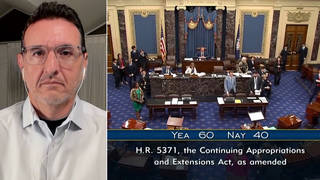
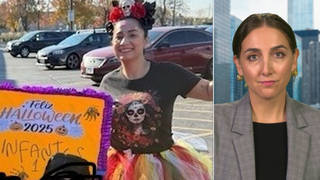
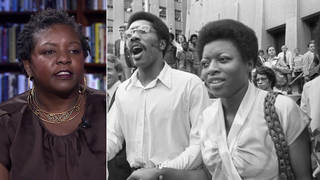
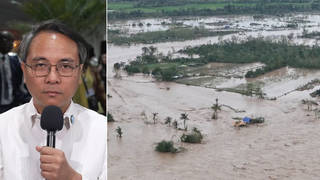





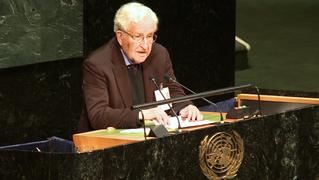
Media Options